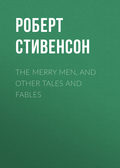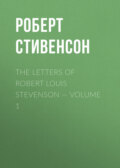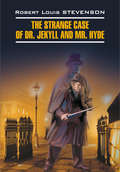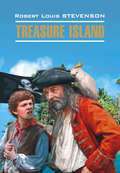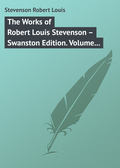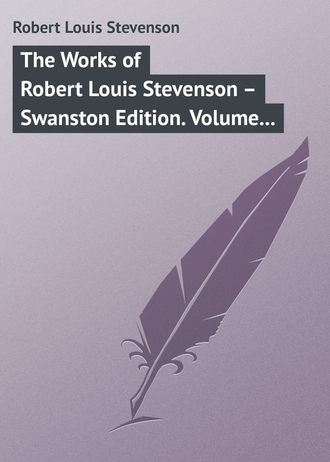
Роберт Льюис Стивенсон
The Works of Robert Louis Stevenson – Swanston Edition. Volume 6
CHAPTER V
TREASURE TROVE
The Doctor’s carriage was a two-wheeled gig with a hood; a kind of vehicle in much favour among country doctors. On how many roads has one not seen it, a great way off between the poplars! – in how many village streets, tied to a gate-post! This sort of chariot is affected – particularly at the trot – by a kind of pitching movement to and fro across the axle, which well entitles it to the style of a Noddy. The hood describes a considerable arc against the landscape, with a solemnly absurd effect on the contemplative pedestrian. To ride in such a carriage cannot be numbered among the things that appertain to glory; but I have no doubt it may be useful in liver complaint. Thence, perhaps, its wide popularity among physicians.
One morning early, Jean-Marie led forth the Doctor’s noddy, opened the gate, and mounted to the driving-seat. The Doctor followed, arrayed from top to toe in spotless linen, armed with an immense flesh-coloured umbrella, and girt with a botanical case on a baldric; and the equipage drove off smartly in a breeze of its own provocation. They were bound for Franchard, to collect plants, with an eye to the “Comparative Pharmacopœia.”
A little rattling on the open roads, and they came to the borders of the forest and struck into an unfrequented track; the noddy yawed softly over the sand, with an accompaniment of snapping twigs. There was a great, green, softly murmuring cloud of congregated foliage overhead. In the arcades of the forest the air retained the freshness of the night. The athletic bearing of the trees, each carrying its leafy mountain, pleased the mind like so many statues; and the lines of the trunk led the eye admiringly upward to where the extreme leaves sparkled in a patch of azure. Squirrels leaped in mid-air. It was a proper spot for a devotee of the goddess Hygieia.
“Have you been to Franchard, Jean-Marie?” inquired the Doctor. “I fancy not.”
“Never,” replied the boy.
“It is a ruin in a gorge,” continued Desprez, adopting his expository voice; “the ruin of a hermitage and chapel. History tells us much of Franchard; how the recluse was often slain by robbers; how he lived on a most insufficient diet; how he was expected to pass his days in prayer. A letter is preserved, addressed to one of these solitaries by the superior of his order, full of admirable hygienic advice; bidding him go from his book to praying, and so back again, for variety’s sake, and when he was weary of both to stroll about his garden and observe the honey-bees. It is to this day my own system. You must often have remarked me leaving the ‘Pharmacopœia’ – often even in the middle of a phrase – to come forth into the sun and air. I admire the writer of that letter from my heart; he was a man of thought on the most important subjects. But, indeed, had I lived in the Middle Ages (I am heartily glad that I did not) I should have been an eremite myself – if I had not been a professed buffoon, that is. These were the only philosophical lives yet open: laughter or prayer; sneers, we might say, and tears. Until the sun of the Positive arose, the wise man had to make his choice between these two.”
“I have been a buffoon, of course,” observed Jean-Marie.
“I cannot imagine you to have excelled in your profession,” said the doctor, admiring the boy’s gravity. “Do you ever laugh?”
“Oh, yes,” replied the other. “I laugh often. I am very fond of jokes.”
“Singular being!” said Desprez. “But I divagate (I perceive in a thousand ways that I grow old). Franchard was at length destroyed in the English wars, the same that levelled Gretz. But – here is the point – the hermits (for there were already more than one) had foreseen the danger and carefully concealed the sacrificial vessels. These vessels were of monstrous value, Jean-Marie – monstrous value – priceless, we may say; exquisitely worked, of exquisite material. And now, mark me, they have never been found. In the reign of Louis Quatorze some fellows were digging hard by the ruins. Suddenly – tock! – the spade hit upon an obstacle. Imagine the men looking one to another; imagine how their hearts bounded, how their colour came and went. It was a coffer, and in Franchard, the place of buried treasure! They tore it open like famished beasts. Alas! it was not the treasure; only some priestly robes, which, at the touch of the eating air, fell upon themselves and instantly wasted into dust. The perspiration of these good fellows turned cold upon them, Jean-Marie. I will pledge my reputation, if there was anything like a cutting wind, one or other had a pneumonia for his trouble.”
“I should like to have seen them turning into dust,” said Jean-Marie. “Otherwise, I should not have cared so greatly.”
“You have no imagination,” cried the Doctor. “Picture to yourself the scene. Dwell on the idea – a great treasure lying in the earth for centuries: the material for a giddy, copious, opulent existence not employed; dresses and exquisite pictures unseen; the swiftest galloping horses not stirring a hoof, arrested by a spell; women with the beautiful faculty of smiles, not smiling; cards, dice, opera singing, orchestras, castles, beautiful parks and gardens, big ships with a tower of sailcloth, all lying unborn in a coffin – and the stupid trees growing overhead in the sunlight, year after year. The thought drives one frantic.”
“It is only money,” replied Jean-Marie. “It would do harm.”
“Oh, come!” cried Desprez, “that is philosophy; it is all very fine, but not to the point just now. And besides, it is not ‘only money,’ as you call it; there are works of art in the question; the vessels were carved. You speak like a child. You weary me exceedingly, quoting my words out of all logical connection, like a parroquet.”
“And at any rate, we have nothing to do with it,” returned the boy submissively.
They struck the Route Ronde at that moment; and the sudden change to the rattling causeway combined, with the Doctor’s irritation, to keep him silent. The noddy jigged along; the trees went by, looking on silently, as if they had something on their minds. The Quadrilateral was passed; then came Franchard. They put up the horse at the little solitary inn, and went forth strolling. The gorge was dyed deeply with heather; the rocks and birches standing luminous in the sun. A great humming of bees about the flowers disposed Jean-Marie to sleep, and he sat down against a clump of heather, while the Doctor went briskly to and fro, with quick turns, culling his simples.
The boy’s head had fallen a little forward, his eyes were closed, his fingers had fallen lax about his knees, when a sudden cry called him to his feet. It was a strange sound, thin and brief; it fell dead, and silence returned as though it had never been interrupted. He had not recognised the Doctor’s voice; but, as there was no one else in all the valley, it was plainly the Doctor who had given utterance to the sound. He looked right and left, and there was Desprez, standing in a niche between two boulders, and looking round on his adopted son with a countenance as white as paper.
“A viper!” cried Jean-Marie, running towards him. “A viper! You are bitten!”
The Doctor came down heavily out of the cleft, and advanced in silence to meet the boy, whom he took roughly by the shoulder.
“I have found it,” he said, with a gasp.
“A plant?” asked Jean-Marie.
Desprez had a fit of unnatural gaiety, which the rocks took up and mimicked. “A plant!” he repeated scornfully. “Well – yes – a plant. And here,” he added suddenly, showing his right hand, which he had hitherto concealed behind his back – “here is one of the bulbs.”
Jean-Marie saw a dirty platter, coated with earth.
“That?” said he. “It is a plate!”
“It is a coach and horses,” cried the Doctor. “Boy,” he continued, growing warmer, “I plucked away a great pad of moss from between these boulders, and disclosed a crevice; and when I looked in, what do you suppose I saw? I saw a house in Paris with a court and garden, I saw my wife shining with diamonds, I saw myself a deputy, I saw you – well, I – I saw your future,” he concluded, rather feebly. “I have just discovered America,” he added.
“But what is it?” asked the boy.
“The Treasure of Franchard,” cried the Doctor; and, throwing his brown straw hat upon the ground, he whooped like an Indian and sprang upon Jean-Marie, whom he suffocated with embraces and bedewed with tears. Then he flung himself down among the heather and once more laughed until the valley rang.
But the boy had now an interest of his own, a boy’s interest. No sooner was he released from the Doctor’s accolade than he ran to the boulders, sprang into the niche, and, thrusting his hand into the crevice, drew forth one after another, encrusted with the earth of ages, the flagons, candlesticks, and patens of the hermitage of Franchard. A casket came last, tightly shut and very heavy.
“Oh what fun!” he cried.
But when he looked back at the Doctor, who had followed close behind and was silently observing, the words died from his lips. Desprez was once more the colour of ashes; his lip worked and trembled; a sort of bestial greed possessed him.
“This is childish,” he said. “We lose precious time. Back to the inn, harness the trap, and bring it to yon bank. Run for your life, and remember – not one whisper. I stay here to watch.”
Jean-Marie did as he was bid, though not without surprise. The noddy was brought round to the spot indicated; and the two gradually transported the treasure from its place of concealment to the boot below the driving-seat. Once it was all stored the Doctor recovered his gaiety.
“I pay my grateful duties to the genius of this dell,” he said. “Oh for a live coal, a heifer, and a jar of country wine! I am in the vein for sacrifice, for a superb libation. Well, and why not? We are at Franchard. English pale ale is to be had – not classical, indeed, but excellent. Boy, we shall drink ale.”
“But I thought it was so unwholesome,” said Jean-Marie, “and very dear besides.”
“Fiddle-de-dee!” exclaimed the Doctor gaily. “To the inn!”
And he stepped into the noddy, tossing his head with an elastic, youthful air. The horse was turned, and in a few seconds they drew up beside the palings of the inn garden.
“Here,” said Desprez – “here, near the table, so that we may keep an eye upon things.”
They tied the horse, and entered the garden, the Doctor singing, now in fantastic high notes, now producing deep reverberations from his chest. He took a seat, rapped loudly on the table, assailed the waiter with witticisms; and when the bottle of Bass was at length produced, far more charged with gas than the most delirious champagne, he filled out a long glassful of froth and pushed it over to Jean-Marie. “Drink,” he said; “drink deep.”
“I would rather not,” faltered the boy, true to his training.
“What?” thundered Desprez.
“I am afraid of it,” said Jean-Marie: “my stomach – ”
“Take it or leave it,” interrupted Desprez fiercely: “but understand it once for all – there is nothing so contemptible as a precisian.”
Here was a new lesson! The boy sat bemused, looking at the glass but not tasting it, while the Doctor emptied and refilled his own, at first with clouded brow, but gradually yielding to the sun, the heady, prickling beverage, and his own predisposition to be happy.
“Once in a way,” he said at last, by way of a concession to the boy’s more rigorous attitude, “once in a way, and at so critical a moment, this ale is a nectar for the gods. The habit, indeed, is debasing; wine, the juice of the grape, is the true drink of the Frenchman, as I have often had occasion to point out; and I do not know that I can blame you for refusing this outlandish stimulant. You can have some wine and cakes. Is the bottle empty? Well, we will not be proud; we will have pity on your glass.”
The beer being done, the Doctor chafed bitterly while Jean-Marie finished his cakes. “I burn to be gone,” he said, looking at his watch. “Good God, how slow you eat!” And yet to eat slowly was his own particular prescription, the main secret of longevity!
His martyrdom, however, reached an end at last; the pair resumed their places in the buggy, and Desprez, leaning luxuriously back, announced his intention of proceeding to Fontainebleau.
“To Fontainebleau?” repeated Jean-Marie.
“My words are always measured,” said the Doctor. “On!”
The Doctor was driven through the glades of paradise; the air, the light, the shining leaves, the very movements of the vehicle, seemed to fall in tune with his golden meditations; with his head thrown back, he dreamed a series of sunny visions, ale and pleasure dancing in his veins. At last he spoke.
“I shall telegraph for Casimir,” he said. “Good Casimir! a fellow of the lower order of intelligence, Jean-Marie, distinctly not creative, not poetic; and yet he will repay your study; his fortune is vast, and is entirely due to his own exertions. He is the very fellow to help us to dispose of our trinkets, find us a suitable house in Paris, and manage the details of our installation. Admirable Casimir, one of my oldest comrades! It was on his advice, I may add, that I invested my little fortune in Turkish bonds; when we have added these spoils of the mediæval Church to our stake in the Mahometan empire, little boy, we shall positively roll among doubloons, positively roll! – Beautiful forest,” he cried, “farewell! Though called to other scenes, I will not forget thee. Thy name is graven in my heart. Under the influence of prosperity I become dithyrambic, Jean-Marie. Such is the impulse of the natural soul; such was the constitution of primæval man. And I – well, I will not refuse the credit – I have preserved my youth like a virginity; another, who should have led the same snoozing, countrified existence for these years, another had become rusty, become stereotype; but I, I praise my happy constitution, retain the spring unbroken. Fresh opulence and a new sphere of duties find me unabated in ardour and only more mature by knowledge. For this prospective change, Jean-Marie – it may probably have shocked you. Tell me now, did it not strike you as an inconsistency? Confess – it is useless to dissemble – it pained you?”
“Yes,” said the boy.
“You see,” returned the Doctor, with sublime fatuity, “I read your thoughts! Nor am I surprised – your education is not yet complete; the higher duties of men have not been yet presented to you fully. A hint – till we have leisure – must suffice. Now that I am once more in possession of a modest competence; now that I have so long prepared myself in silent meditation, it becomes my superior duty to proceed to Paris. My scientific training, my undoubted command of language, mark me out for the service of my country. Modesty in such a case would be a snare. If sin were a philosophical expression, I should call it sinful. A man must not deny his manifest abilities, for that is to evade his obligations. I must be up and doing; I must be no skulker in life’s battle.”
So he rattled on, copiously greasing the joint of his inconsistency with words; while the boy listened silently, his eyes fixed on the horse, his mind seething. It was all lost eloquence; no array of words could unsettle a belief of Jean-Marie’s; and he drove into Fontainebleau filled with pity, horror, indignation, and despair.
In the town Jean-Marie was kept a fixture on the driving-seat, to guard the treasure; while the Doctor, with a singular, slightly tipsy airiness of manner, fluttered in and out of cafés, where he shook hands with garrison officers, and mixed an absinthe with the nicety of old experience; in and out of shops, from which he returned laden with costly fruits, real turtle, a magnificent piece of silk for his wife, a preposterous cane for himself, and a képi of the newest fashion for the boy; in and out of the telegraph office, whence he despatched his telegram, and where three hours later he received an answer promising a visit on the morrow, and generally pervaded Fontainebleau with the first fine aroma of his divine good-humour.
The sun was very low when they set forth again; the shadows of the forest trees extended across the broad white road that led them home; the penetrating odour of the evening wood had already arisen, like a cloud of incense, from that broad field of tree-tops; and even in the streets of the town, where the air had been baked all day between white walls, it came in whiffs and pulses, like a distant music. Half-way home, the last gold flicker vanished from a great oak upon the left; and when they came forth beyond the borders of the wood, the plain was already sunken in pearly greyness, and a great, pale moon came swinging skyward through the filmy poplars.
The Doctor sang, the Doctor whistled, the Doctor talked. He spoke of the woods, and the wars, and the deposition of dew; he brightened and babbled of Paris; he soared into cloudy bombast on the glories of the political arena. All was to be changed; as the day departed, it took with it the vestiges of an outworn existence, and to-morrow’s sun was to inaugurate the new. “Enough,” he cried, “of this life of maceration!” His wife (still beautiful, or he was sadly partial) was to be no longer buried; she should now shine before society. Jean-Marie would find the world at his feet; the roads open to success, wealth, honour, and posthumous renown. “And oh, by the way,” said he, “for God’s sake keep your tongue quiet! You are, of course, a very silent fellow; it is a quality I gladly recognise in you – silence, golden silence! But this is a matter of gravity. No word must get abroad; none but the good Casimir is to be trusted; we shall probably dispose of the vessels in England.”
“But are they not even ours?” the boy said, almost with a sob – it was the only time he had spoken.
“Ours in this sense, that they are nobody else’s,” replied the Doctor. “But the State would have some claim. If they were stolen, for instance, we should be unable to demand their restitution; we should have no title; we should be unable even to communicate with the police. Such is the monstrous condition of the law.2 It is a mere instance of what remains to be done, of the injustices that may yet be righted by an ardent, active, and philosophical deputy.”
Jean-Marie put his faith in Madame Desprez; and as they drove forward down the road from Bourron, between the rustling poplars, he prayed in his teeth, and whipped up the horse to an unusual speed. Surely, as soon as they arrived, madame would assert her character, and bring this waking nightmare to an end.
Their entrance into Gretz was heralded and accompanied by a most furious barking; all the dogs in the village seemed to smell the treasure in the noddy. But there was no one in the street, save three lounging landscape-painters at Tentaillon’s door. Jean-Marie opened the green gate and led in the horse and carriage; and almost at the same moment Madame Desprez came to the kitchen threshold with a lighted lantern; for the moon was not yet high enough to clear the garden walls.
“Close the gates, Jean-Marie!” cried the Doctor, somewhat unsteadily alighting. – “Anastasie, where is Aline?”
“She has gone to Montereau to see her parents,” said madame.
“All is for the best!” exclaimed the Doctor fervently. “Here quick, come near to me; I do not wish to speak too loud,” he continued. “Darling, we are wealthy!”
“Wealthy!” repeated the wife.
“I have found the treasure of Franchard,” replied her husband, “See, here are the first-fruits; a pine-apple, a dress for my ever-beautiful – it will suit her – trust a husband’s, trust a lover’s taste! Embrace me, darling! This grimy episode is over; the butterfly unfolds its painted wings. To-morrow Casimir will come; in a week we may be in Paris – happy at last! You shall have diamonds. – Jean-Marie, take it out of the boot, with religious care, and bring it piece by piece into the dining-room. We shall have plate at table! Darling, hasten and prepare this turtle; it will be a whet – it will be an addition to our meagre ordinary. I myself will proceed to the cellar. We shall have a bottle of that little Beaujolais you like, and finish with the Hermitage; there are still three bottles left. Worthy wine for a worthy occasion.”
“But, my husband, you put me in a whirl,” she cried. “I do not comprehend.”
“The turtle, my adored, the turtle!” cried the Doctor; and he pushed her towards the kitchen, lantern and all.
Jean-Marie stood dumfoundered. He had pictured to himself a different scene – a more immediate protest, and his hope began to dwindle on the spot.
The Doctor was everywhere, a little doubtful on his legs, perhaps, and now and then taking the wall with his shoulder; for it was long since he had tasted absinthe, and he was even then reflecting that the absinthe had been a misconception. Not that he regretted excess on such a glorious day, but he made a mental memorandum to beware; he must not, a second time, become the victim of a deleterious habit. He had his wine out of the cellar in a twinkling; he arranged the sacrificial vessels, some on the white table-cloth, some on the sideboard, still crusted with historic earth. He was in and out of the kitchen, plying Anastasie with vermouth, heating her with glimpses of the future, estimating their new wealth at ever larger figures; and before they sat down to supper, the lady’s virtue had melted in the fire of his enthusiasm, her timidity had disappeared; she, too, had begun to speak disparagingly of the life at Gretz; and as she took her place and helped the soup, her eyes shone with the glitter of prospective diamonds.
All through the meal she and the Doctor made and unmade fairy plans. They bobbed and bowed and pledged each other. Their faces ran over with smiles; their eyes scattered sparkles, as they projected the Doctor’s political honours and the lady’s drawing-room ovations.
“But you will not be a Red!” cried Anastasie.
“I am Left Centre to the core,” replied the Doctor.
“Madame Gastein will present us – we shall find ourselves forgotten,” said the lady.
“Never,” protested the Doctor. “Beauty and talent leave a mark.”
“I have positively forgotten how to dress,” she sighed.
“Darling, you make me blush,” cried he. “Yours has been a tragic marriage!”
“But your success – to see you appreciated, honoured, your name in all the papers, that will be more than pleasure – it will be heaven!” she cried.
“And once a week,” said the Doctor, archly scanning the syllables, “once a week – one good little game of baccarat?”
“Only once a week?” she questioned, threatening him with a finger.
“I swear it by my political honour,” cried he.
“I spoil you,” she said, and gave him her hand.
He covered it with kisses.
Jean-Marie escaped into the night. The moon swung high over Gretz. He went down to the garden end and sat on the jetty. The river ran by with eddies of oily silver, and a low monotonous song. Faint veils of mist moved among the poplars on the farther side. The reeds were quietly nodding. A hundred times already had the boy sat, on such a night, and watched the streaming river with untroubled fancy. And this perhaps was to be the last. He was to leave this familiar hamlet, this green, rustling country, this bright and quiet stream; he was to pass into the great city; his dear lady mistress was to move bedizened in saloons; his good, garrulous, kind-hearted master to become a brawling deputy; and both be lost for ever to Jean-Marie and their better selves. He knew his own defects; he knew he must sink into less and less consideration in the turmoil of a city life, sink more and more from the child into the servant. And he began dimly to believe the Doctor’s prophecies of evil. He could see a change in both. His generous incredulity failed him for this once; a child must have perceived that the Hermitage had completed what the absinthe had begun. If this were the first day, what would be the last? “If necessary, wreck the train,” thought he, remembering the Doctor’s parable. He looked round on the delightful scene; he drank deep of the charmed night-air, laden with the scent of hay. “If necessary, wreck the train,” he repeated. And he rose and returned to the house.



